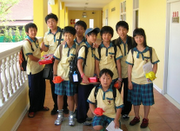
Dear all,
Yale’s Chinese debate team defeated delegations from universities around the world to claim victory in last week’s International Varsity Debate series, jointly hosted by New Media Singapore and China Central Television.
The team — composed of Adam Scharfman ’08, Nick Sedlet ’08, Austin Woerner ’08 and J.T. Kennedy ’09 — beat students from Oxford University in the final round of the debate competition in Beijing to win the championship last Tuesday. “I think what it says about our program of Chinese language instruction is extraordinary,” University President Richard Levin said.
From the beginning of the tournament — which took place from Nov. 19 to Nov. 30 — Yale’s team was favored to win, East Asian studies professor and team coach Wei Su said. Despite the pressure this expectation placed on the students for the rest of the competition, he said, Yale was deemed by many observers to be the most skilled team.
The University’s team members returned to New Haven on Nov. 30.Yale’s team was in a bracket with five other universities at which Chinese is not the native language. Six native Chinese-speaking universities competed in a separate bracket.
The team faced off against Oxford in the first round, debating the question of whether smoking should be completely or partially banned in public places, a jet-lagged Scharfman said early Sunday morning in the Branford College common room. Despite having to argue the more difficult stance — that smoking should only be partially banned — Scharfman said, the judges appreciated Yale’s arguments, which focused on individual rights.
Ewha Womans University in South Korea was the Yale team’s next competitor. The two teams debated whether bullfighting in Spain should be banned, with Yale taking the affirmative. The South Koreans’ language skills were impressive, Scharfman said, but they weakened their argument by not dealing with the issue of bullfighting’s cruelty. “We kept asking them if they thought it was cruel,” he said. “But they kept on dancing around it, saying bullfighting was beautiful.”
After Oxford defeated Russia’s Moscow State Institute of International Relations in the semifinals, the Yale team faced the Oxford students again in the final round. This time, the question related directly to university life, Scharfman said: Should institutions of higher education be easy to get into and difficult to graduate from, or hard to get into and easy to graduate from?
Yale’s team defended the position that universities should be difficult to get into and easy to graduate from by arguing that such a policy would increase the quality of students at universities while also allowing them to explore a range of opportunities with an open mind, Scharfman said.
The team argued that Yale falls into this category of school, Scharfman said, given that it has a very low acceptance rate but a high graduation rate. The debates were evaluated by four judges, each of whom had one vote, and a 12-person “jury” with one vote between them, Scharfman said. The judges were drawn from a pool of international Chinese professors, members of the Chinese media and political figures familiar with China.
At the end of each debate, team members were asked to recite a poem, play a musical instrument or talk about the experience of studying Chinese, Scharfman said. These events showcased the diverse talents of the Yale team, Kennedy said. “A lot of the other teams didn’t really have much to offer,” he said. “But all of our team members have very well-developed interests within the areas of Chinese language and culture.”
Kennedy participated in the three-person debate in October, when students from Tsinghua University in Beijing came to New Haven for the first round of the tournament. Yale was deemed the winner among Columbia, Princeton and Harvard universities, an initial victory that allowed Yale to represent the United States in the finals in Beijing.
But the team decided to rotate in alternate Sedlet for the Beijing rounds, Scharfman said. Kennedy, who became the alternate for the finals, helped the team prepare for debates by researching arguments and organizing fan support in Beijing, Scharfman said.
The tournament’s sponsors paid for the team’s airfare, lodging and food. Sedlet said although the experience was a valuable one, it was fairly stressful. “They kept us pretty overscheduled and on a tight leash,” he said. Light Fellowship Director Kelly McLaughlin said the team’s success is a reflection of the strength of Yale’s Chinese program, as well as of the availability of Light Fellowships to send students to study in China.
“This victory sends a message that Yale University might well have one of the best Chinese language programs available anywhere in the world,” McLaughlin said in an e-mail Sunday. “[It] gives one concrete measure of how Yale’s liberal arts education leads not only to technical skill but also to the ability to synthesize diverse knowledge in impressive, non-scripted ways, even when under tremendous pressure to perform.”
CCTV will continue to broadcast the debates for the next few weeks, Scharfman said, and the debates can also be viewed on CCTV’s Web site.
The network has no editorial independence from the Chinese government.
Regards,
Rashedul Hasan Stalin
Source: http://www.yaledailynews.com/articles/view/22663














2 comments:
In the image they stood perfectly. The competition is for 4 channel dvr or CCTV? If there is video instead of image it will be nice, that we can understand who are the winners.
Post a Comment